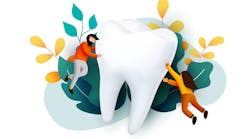Old toothbrush risk
The Chief Executive of the UK’s largest oral health charity urges more people to start investing in new toothbrushes more regularly before toothbrushes develop into a “breeding ground” for germs and bacteria.
To read more about toothbrushes, go to toothbrushes.
Numerous studies over the years have reported the toothbrush to be the cause of repeated infection in the mouth. Not only able to grow and reproduce on the bristles of the brush, the bacteria also have the ability to transmit organisms responsible for diseases throughout the body.
Yet past surveys conducted by the foundation show that almost two-thirds of the population fail to change their toothbrush after the recommended three months.
“They may seem like a rather insignificant tool but they form a crucial part of our daily routine and although most toothbrushes are used twice a day for months on end, they are rarely cleaned thoroughly and are often kept in warm, moist conditions, ideal for bacterial growth,” said Dr Carter.
“Despite this, there is little public awareness that the bristles may become contaminated by either the hundreds of microorganisms thriving in the mouth or the many thousands living in the environment.”
Dr. Carter added: “It is so simple, but by replacing a toothbrush more often, we can prevent a lot of unnecessary illness and disease. The strongest argument to change your toothbrush regularly is to prevent re-infection following the flu or a cold. A dirty toothbrush can also be responsible for many ear, nose, and throat infections.
“Perhaps it is considered an unnecessary expense but changing your toothbrush, or the head of an electric toothbrush, is actually very cheap. To spend £8 a year for four toothbrushes is nothing compared to losing a day off work and spending large amounts of money on preventable dental work, unnecessary prescriptions, or over-the- counter medicines due to poor oral health.
"There are plenty products on the market which claim to successfully disinfect toothbrushes, although the effectiveness of them is very debatable. My advice would be, after three months, to buy a new toothbrush and begin to re-use the old brush for alternative household chores. When it is completely worn out then recycle it.”
The Foundation is looking to increase public awareness of how best to maintain or develop good oral health as part of its National Smile Month campaign, which has been in place since 1977.
Another survey conducted by the Foundation as part of the nationwide oral health campaign showed that almost two-thirds of Britons would be happy to lend their toothbrush to partners, children, friends, and even celebrities.
"It might seem kind to share your toothbrush with a close friend, but it's a very bad idea," Dr. Carter said. "Sharing a toothbrush leaves people susceptible to all sorts of oral and general health problems. But even if you don't let anyone else use your brush, you still need to replace it every three months to make sure germs don't build up, and to keep your brushing as effective as possible."
For more information, go to www.dentalhealth.org.
To comment on this subject, go to community.pennwelldentalgroup.com/.

